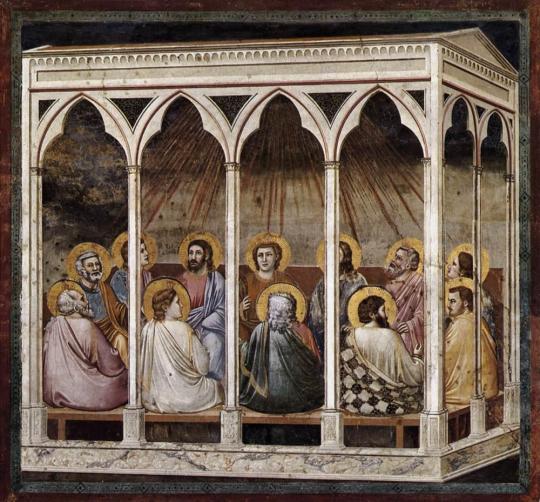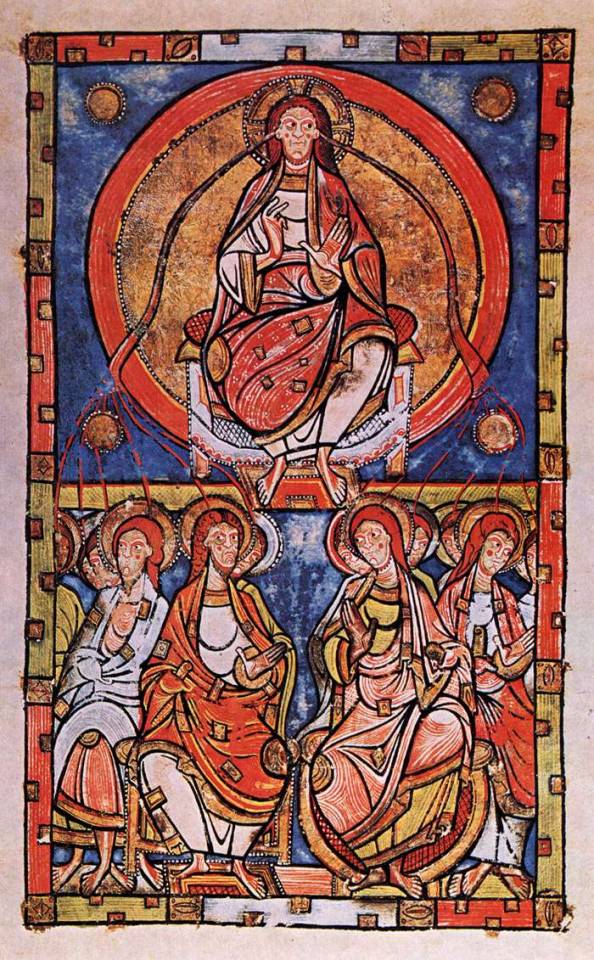#the acts of the apostles
Explore tagged Tumblr posts
Text

"Who looking upon him, and seeing that he had faith to be healed, said with a loud voice: Stand upright on thy feet. And he leaped up, and walked. And when the multitudes had seen what Paul had done, they lifted up their voice in the Lycaonian tongue, saying: The gods are come down to us in the likeness of men"
The Acts of the Apostles 14:8-9-10 Douay-Rheims Bible.
Artwork: Jacob Jordaens, Saint Paul at Lystra.
#catholicism#St. Paul#New Testament#Miracles#Bible quotes#douay rheims bible#The acts of the Apostles
0 notes
Text

#the elect angels#dragon ball z#the acts of the apostles#angels#saturday sabbath#daily bread#nightly bread#god is love#bible
0 notes
Text

Scenes from the Life of Christ: 23. Pentecost, Giotto, between 1304 and 1306 (fresco in the Scrovegni Chapel, Padua)
#Pentecost#liturgical year#liturgical calendar#art#art history#Giotto#Giotto di Bondone#Middle Ages#medieval#medieval art#religious art#Biblical art#Christian art#Christianity#Catholicism#Book of Acts#Acts of the Apostles#Gothic art#International Gothic#Italian Gothic#Trecento#Italian art#14th century art#fresco#Scrovegni Chapel
833 notes
·
View notes
Text

I am SO sorry to whoever designed the Apostle of Myrkul it's a very cool design and the fight was fun but I laughed so hard at the reveal
| First | | Previous | | Next |
[[ All Croissant Adventures (chronological, desktop) ]]
[[ All Croissant Adventures (app) ]]
#even the apostle of myrkul loves the silly little hats in this game#respect#bg3#baldur's gate 3#bg3 spoilers#act II spoilers#SERIOUSLY DON'T LOOK AT THIS IF YOU'RE NOT AT THE END OF ACT 2 AAAAAA#croissant adventures#tav#myrkul#apostle of myrkul#comics
549 notes
·
View notes
Text
Utterances of Christ on the cross in the gospel of Luke | Statements of Stephen the Martyr in Acts (also by Luke)
Christ:

Stephen:

Christ:

Stephen:

Christ:

Stephen:

60 notes
·
View notes
Text

ACTS 2
Heavy Outpouring of Holy Spirit Gonna Come Upon All The Churches Globally, Even Unto The Ends of The Earth
(Fulfillment of Prophecy of Joel 2:28-32)
#jesus#jesus christ#jesus loves you#bible#bible scripture#gospel#jesussaves#jesusisgod#jesus is coming#faith in jesus#lord jesus christ#jesus loves the little children#jesus is the only way#jesusislord#jesus is king#jesus of nazareth#savior#holy spirit#acts#apostle#evangelicals#power of god#glory#glory of god#pentecostal#tongues#fire of god#faithinchrist#faith in god#christian faith
13 notes
·
View notes
Text

15 notes
·
View notes
Text
You can't be a nobody AND believe in Jesus at the same time, it's impossible.
Acts of the Apostles 1:7-8 NLT
[7] He replied, “The Father alone has the authority to set those dates and times, and they are not for you to know. [8] But you will receive power when the Holy Spirit comes upon you. And you will be my witnesses, telling people about me everywhere—in Jerusalem, throughout Judea, in Samaria, and to the ends of the earth.”
This was after Jesus had spent three years with the disciples, teaching them and guiding them for three years. He taught them everything he thought they needed to know. He spent everyday with them leading by example, performing miracles, raising the dead, healing disease, comforting the hurt, forgiving the sinners, giving sermons, teaching them all kinds of truth, trying to show them the right way, always. Patiently. Gently. With grace and mercy. Always trying to nug them in the right direction.
Then he said this to them after 3 years. After having been shocked by the crucifixion. The state of total disarray, panic, not understanding what's going on, but now the resurrection has come and this is what he says to them, he says,
'Now look, you go sit down in the city of Jerusalem, sit down in the city of Jerusalem until you are endued with power from on high.'
He's trying to tell them in Acts 1:7-8 that, "you may have heard all this, you may have seen all this, you may have witnessed all the things I have done, but you're still not ready to do the work I have called you to do, not until the 'spirit of God' indwells you.
Now in the Old testament the Holy Spirit would come down on God's servants and it would come and it would go, but on Pentecost it came down onto this Earth so that it indwelled all believers on this Earth so that from that point on every single person who is a child of God is indwelled by a person of the trinity called the Holy Spirit.
Some people, all they get out of the Bible is knowledge. They go to Sunday school, the teacher teaches a lesson and that's it.
But who's the teacher? The Holy Spirit. Who's the equipper? The Holy Spirit. Who gives interpretation of the word of God? The Holy Spirit.
Listen, it is the power of the Holy Spirit within you. That's why he told them "you're not ready until the spirit of God comes upon you," and then, it is the authority of the Spirit, the power of the Spirit, the unction of the Spirit that is what teaches through the Sunday school teacher, the pastor, the evangelist, sings through a musician, you name it.
God intends for all of us to do our work in his power and his energy in his strength and by his authority. What is done apart from the holy spirit is flesh, its mans own human effort. We can never carry out spiritual work, God's work, and the flesh in our own energy apart from the Holy Spirit. That is one of the prime reasons he sent the Holy Spirit.
You may be a pastor and think "well, I study and I pray and God gives me a message and I just get up and do it" and you ignore the Holy Spirit. You're not relying upon him for wisdom, you're not relying upon him for courage, you're not relying upon him for inspiration, you're not relying upon him for motivation, you're not relying upon him for interpretation, you're not relying upon him for power, you're not relying upon him for authority. You cannot do what God has called you to do the way He intendeds for you to do it apart from the Holy Spirit.
That's who He is, that's why He came, and there is no substitute for the Holy Spirit. You can't put enough PhDs, ThDs, RfDs, or any other kind of D behind anybody's name and make them adequate to do the work that God has called them to do. You cannot do it.
Romans 8:26 NLT
[26] And the Holy Spirit helps us in our weakness. For example, we don’t know what God wants us to pray for. But the Holy Spirit prays for us with groanings that cannot be expressed in words.
"at a critical moment in my life I was praying one night and the Lord spoke to my heart and he said crystal clear I'll never forget it, "whatever you accomplish in life you will have to accomplish on your knees in prayer, not by education, not by talents, not by might, not buy gifts, but by calling out to me, by crying out to me, it has to be on your knees" because God knew that that meant for me 'total dependence on the Holy Spirit.'" -Dr. Charles Stanley.
Listen when you and I are praying He is involved. One of his responsibilities is here in Romans 8:26, the Holy Spirit prays for us with us, and through us, he intercedes for us because we don't even know what to pray for sometimes. Have you ever been on your knees and crying out to God, and you don't know what to ask, you just know they're in trouble you don't even know what to say you just ask "God help them." You just say "Lord I trust your work in their life" whether you're praying for yourself or someone else, the Spirit of God is taking your prayers and He interprets it personally and perfectly before the Father because He knows our heart. The trinity knows everything at all times in every given circumstance and he works on your behalf. You are a part of that trinity, you are what makes it complete, that spirit that dwells within you makes you a somebody. Somebody with purpose and with reason.
John 15:26 NLT
[26] “But I will send you the Advocate —the Spirit of truth. He will come to you from the Father and will testify all about me.
The Holy Spirit is conviction. It will convict you to lead a life apart from others. It will convict you to abandon the darkness and to embrace the light. It will guide you and teach you how to become a light. The Holy Spirit is a person. He is a Helper, an Advocate. Someone on your side rooting for you at all times, always there to comfort you, always there to hear your cries, always there to lend a helping hand in any way he can.
We need to walk in the spirit.
We need to understand this
To walk in the Spirit, or by the spirit, is to live moment by moment in dependency on him, sensitive to his voice, and in obedience to him.
Those three things:
Dependence
Sensitive
Obedience
Everyday of our life, moment by moment, as a believer we are to walk aware of the spirit of God in our life. That is the Christian life.
May God bless you, always. 🤍
#acts of the apostles#book of acts#acts#bible scripture#bible study#bible reading#bible verse#daily devotion#daily devotional#devotional#book of romans#book of john#charles stanley#christian faith#faith in jesus#christian blog#christian living#faith in god#jesus loves you#jesussaves#jesus christ#christian quotes#christblr#christian#christian tumblr#follower of christ#christianity#love jesus#follow jesus#holy spirit
18 notes
·
View notes
Text

The Predication of Saint Paul
Artist: Joseph-Benoît Suvée (Flemish, 1743–1807)
Date: circa 1779, Belgium
Medium: Oil on Canvas
Collection: Los Angeles County Museum of Art, Los Angeles, CA, United States
Paul the Apostle
Paul also named Saul of Tarsus, commonly known as Paul the Apostle and Saint Paul, was a Christian apostle who spread the teachings of Jesus in the first-century world. For his contributions towards the New Testament, he is generally regarded as one of the most important figures of the Apostolic Age, and he also founded several Christian communities in Asia Minor and Europe.
The main source of information on Paul's life and works is the Acts of the Apostles in the New Testament. Approximately half of its content documents his travels, preaching and miracles. Paul was not one of the Twelve Apostles, and did not know Jesus during his lifetime. According to the Acts, Paul lived as a Pharisee and participated in the persecution of early disciples of Jesus, possibly Hellenised diaspora Jews converted to Christianity, in the area of Jerusalem, prior to his conversion. Some time after having approved of the execution of Stephen, Paul was traveling on the road to Damascus so that he might find any Christians there and bring them "bound to Jerusalem". At midday, a light brighter than the sun shone around both him and those with him, causing all to fall to the ground, with the risen Christ verbally addressing Paul regarding his persecution in a vision. Having been made blind, along with being commanded to enter the city, his sight was restored three days later by Ananias of Damascus. After these events, Paul was baptized, beginning immediately to proclaim that Jesus of Nazareth was the Jewish messiah and the Son of God. He made three missionary journeys to spread the Christian message to non-Jewish communities in Asia Minor, the Greek provinces of Achaia, Macedonia, and Cyprus, as well as Judea and Syria, as narrated in the Acts.
#painting#bible story#apostle paul#joseph benoit suvee#flemish painter#european art#oil on canvas#18th century painting#male#women#man#architecture#religious art#christianity#new testament#cloudy skies#books of acts#christian art#gospel#good news#salvation
13 notes
·
View notes
Photo

Acts 4:33 (NLT) - The apostles testified powerfully to the resurrection of the Lord Jesus, and God’s great blessing was upon them all.
114 notes
·
View notes
Text

"Were we, on the contrary, to close the book of Acts, we would imply something drastic about ourselves: that holiness and heroism had somehow been pre-empted by the ancestors, but in our time had fled the earth. To leave the story open, unfinished, awaiting our acts and choices, on the other hand, is a sign of trust. Holiness and heroism, the faith that moves mountains and overcomes death, these are among us, within us; for God is God and the world, and our poor selves, are charged with God's grandeur."
Daniel Berrigan, The Acts of the Apostles and Ourselves
7 notes
·
View notes
Text

A stylized depiction of the Holy Spirit descending upon the Apostles at Pentecost. Miniature illumination on parchment from the Sacramentary of Saint-Étienne, executed by an unknown 12th-century artist in Limoges for the Saint-Étienne Cathedral in Toulouse. Now in the Bibliothèque Nationale, Paris.
#art#art history#Middle Ages#medieval#medieval art#religious art#Biblical art#Christian art#Christianity#Catholicism#Acts of the Apostles#Pentecost#miniature#illuminated manuscript#manuscript illumination#French art#12th century art#Bibliothèque Nationale
233 notes
·
View notes
Text
2024 MAY 10 Friday
"Do not be afraid. Go on speaking, and do not be silent, for I am with you."
~ Acts 18:9b-10a
#bible#verse#scripture#first reading#Acts#Acts of the Apostles#do not be afraid#go on speaking#I am with you#God#Lord#Jesus#Jesus Christ#Christ
16 notes
·
View notes
Photo

Was Christ a common name around the time the Bible was written?
No, because “Christ” is not a name; it is a title. It comes from the Ancient Greek word χριστός (chrīstós), which means “anointed one.” The Greek word comes from the verb χρίω (chrī́ō), which means “to anoint.” The word in Greek is used in the New Testament as a calque of the Hebrew word מָשִׁיחַ (māšîaḥ), which also means “anointed one.” Neither of these words were names; they are both, in fact, titles. Nonetheless, because Jesus is so often referred to in the English-speaking world as “Jesus Christ,” many people have come to incorrectly believe that “Christ” is Jesus’s last name.
Ironically, although Christ was certainly not a common name in Jesus’s time—or even a name at all—Jesus actually was an extremely common name. The name Jesus is an Anglicization of the Latin name Iesus, which is a Latinization of the Greek name Ἰησοῦς (Iēsoûs), which is a Hellenization of Jesus’s original name in Aramaic ישוע (Yēšū́aʿ).
Yēšū́aʿ was an extremely common name for Jewish men in the early first century AD. Indeed, Jesus of Nazareth is not even the only person by that name who is mentioned in the New Testament. Other notable Jesuses mentioned in the New Testament include Jesus Barabbas in the gospels and Jesus Justus in the Book of the Acts of the Apostles.
#kemetic dreams#jesus#book of acts#acts#acts of the apostles#latin#iesus#iesous#yesua#hellenization#aramaic#new testament#christ#hebrew
76 notes
·
View notes
Text

Acts 16:31. This passage of the Bible opens a window into a pivotal moment in early Christian history, offering timeless wisdom and spiritual guidance.
Within the context of Acts 16, we find Paul and Silas imprisoned in Philippi, their fate seemingly sealed within the depths of a cold and foreboding cell. An extraordinary event occurs—a powerful earthquake shakes the very foundations of the prison, flinging open the doors and unshackling the chains that bind the prisoners. Amidst this chaos, the jailer, fearing that the prisoners have escaped, contemplates taking his own life.
It is here that the narrative unfolds into an inspiring discourse about salvation. Paul intervenes, assuring the jailer that all the prisoners remain. Profoundly affected by the miraculous events, the jailer poses a question that has echoed through the ages, and that forms the core of Acts 16:31. Seeking the path to salvation, he asks, "Sirs, what must I do to be saved?"
Paul and Silas respond with a statement of sublime simplicity and monumental significance, "Believe on the Lord Jesus Christ, and you will be saved, you and your household." Acts 16:31 captures the essence of the Christian message of faith and offers a beacon of hope not just to the jailer, but to all who seek redemption.
This declaration is not merely advice but is considered a cornerstone of Christian doctrine—the assurance that faith in Jesus Christ is the key to spiritual salvation, a theme that resonates through the New Testament. It suggests a personal and transformative relationship with Jesus and extends this promise to the jailer's family, indicating the communal and expansive nature of Christian salvation.
Acts 16:31 thus stands as an invitation to explore the depths of faith, the power of divine intervention, and the hope of salvation that is central to the Christian faith. It's a verse that has inspired countless individuals throughout history and continues to be a source of strength and reflection for believers today.
10 notes
·
View notes
Text

they’re gonna kick me out of bible study
#i am not even joking acts 4:34-35 says there was not a needy person among them#for as many as were owners of lands or houses sold them and brought the proceeds of what was sold#and laid it at the apostles feet and it was distributed to each as any had need.#the american church is doing an abominably poor job at being a church. letting americanism (heresy) and the party line gut the bible#i can already tell what the discussion is gonna be. the leader is gonna reassure the group that this doesnt mean socialism#and just encourage everyone to give a little more money to charities :)#how about we become radically sacrificial and anti materialistic instead.#stop buying thing stop consuming things cancel your amazon subscriptions and welcome a struggling family into your giant suburban house#wealth and materialism are so so evil :) and i see christians praising them all the time :) you cannot serve god and mammon :)#put away the gods of your fathers :) or else :)
24 notes
·
View notes